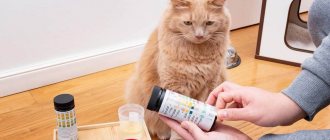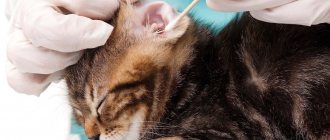Bloody stool is one of the most common problems faced by cats of any age and breed. Under no circumstances should it be left unattended. It is important to contact a veterinarian to find out what is the cause of bloody stools, how to help your pet, and whether possible problems can be prevented in the future.
Read in this article:
- Causes of blood in stool
- Additional symptoms
- What is important to pay attention to?
- Your actions
- Diagnostics
- Blood in a cat's stool: treatment
- Prevention
Causes of blood in stool
The first thing you need to pay attention to is the appearance of the blood. If it is fresh, this indicates that the bleeding began near the anus (for example, the anal sphincter is injured) or in the large intestine.
We draw your attention to the most common reasons why your cat goes to the toilet with blood:
- Eating disorder
- Parasites
- Gastrointestinal diseases
- Foreign bodies
- Neoplasms
- Dysbacteriosis
- Bleeding disorders
- Poisoning with toxic substances
If your pet's diet consists of low-quality dry food, its particles can injure the mucous membranes of the stomach. The likelihood of injury increases if the cat drinks little water. Dry food does not soak, and its sharp ends injure the stomach.
Worms, Giardia, coccidia and other helminths (protozoa) increase capillary permeability and injure the mucous membranes of the stomach. As a result, blood is mixed with the stool, but its volume depends on the number of parasites in the body.
Acute pancreatitis, liver dystrophy, chronic colitis and enteritis are just some of the diseases of the gastrointestinal tract that can cause the appearance of blood clots in the stool. If with an ulcer blood impurities are very noticeable, then with other diseases they are practically invisible.
Most often they enter the gastrointestinal tract during eating or drinking. Foreign objects (for example, pieces of plastic, bones) damage the integrity of soft tissues or cause constipation, in which solid feces slowly pass through the intestines, causing injury.
Passing through the intestine with malignant or benign neoplasms, feces encounter growths. The result is damage to the mucous membranes and the formation of blood impurities in the cat’s stool.
Intestinal bloating, heaviness and grumbling, as well as blood impurities in the stool - these signs are characteristic of dysbiosis that occurs when consuming low-quality or expired products (for example, spoiled milk or sour cream).
If your cat has problems with blood clotting (for example, a deficiency of vitamin K or prothrombin in the body), then even a minor injury can lead to severe bleeding.
Krysid, zoocoumarin and other poisons intended for rodents act on the principle of coagulants. By eating them, the cat's blood clotting is impaired, so a lot of blood appears in the feces. The only way to save your pet is to immediately contact a veterinarian.
Natural Home Remedies
If blood is found in your kitten's stool one day and he is still eating and playing as usual, you shouldn't worry so much. Perhaps the root cause is a slight gastrointestinal upset due to overeating or eating someone else's food. Moreover, some cats' digestive systems are easily irritated by stress or sudden environmental changes. These include introducing a new pet into the home, giving birth, and changing your daily diet. Cats often need time to adapt to new brands of food to avoid acute complications.
In this case, try to keep the kitten away from food for at least 24 hours, but it is okay to give him fresh water. This way, his body will only be able to cope with the culprits in the digestive system, instead of taking in new foods. After this, your cat should be fed boiled rice, skinless chicken and plain yogurt to soothe the digestive system. It is also recommended to use a natural diet without additives or preservatives to keep your cat in shape.
You also want your cat to feel at ease. The more stressed a cat is, the more likely she is to develop colitis. Try to minimize changes to his daily routine, such as moving house or any new members moving in.
Additional symptoms
Blood in a cat's stool is often not the only symptom. If the cause of bloody stool is an infectious disease or the appearance of neoplasms in the gastrointestinal tract, then your pet will have other accompanying signs.
Among them:
- sudden weight loss,
- vomit,
- diarrhea,
- strong thirst
- sluggish and apathetic state,
- frequent urination (pay attention to the urine: it may also contain small amounts of blood),
- pain in the abdominal area.
Are you observing one or more signs in your pet? Don't hesitate - seek help from a professional veterinarian. He will give the cat an accurate diagnosis and prescribe effective treatment for the disease.
Symptoms of diseases that cause bleeding
A disorder of the digestive system is accompanied by a cat’s poor appetite or even refusal to eat. The animal is in a depressed state. Other standard symptoms :
- soreness and tension of the peritoneum;
- bowel dysfunction (constipation or diarrhea);
- In addition to blood, mucus and gas bubbles appear in the stool;
- increased gas formation;
- nausea and vomiting.
© shutterstock
If the cause of the appearance of blood is poisoning, the mucous membranes become yellowish and the liver enlarges. With pathologies of the urinary tract, the cat experiences increased anxiety and a depressed state. The animal refuses to eat and often goes to the toilet.
When trying to pee, the cat gets very worried, meows nervously, and cannot settle down in any way. A sick animal strives for privacy and sometimes becomes aggressive when trying to stroke or caress it. The pet is experiencing pain in the lower abdomen and sacrum area.
What is important to pay attention to?
If your cat is walking around with a lot of blood, then carefully monitor your pet's condition. Pay attention to how often blood is present in his stool: once or regularly (for example, every time he visits the litter box).
It is important to consider whether your pet's behavior changes when visiting the litter box (for example, he meows or moans loudly, his tension and anxiety are noticeable). See how much blood is released: droplets, small clots or large amounts of impurities.
Other points that are important to pay attention to:
- change in appetite
- the presence of impurities in the stool (mucus, hairballs),
- increase in body temperature,
- general condition of the pet.
Note! All this is necessary to answer all the veterinarian’s questions if necessary. Taking into account your information, he will make a diagnosis and determine effective treatment.
What to do before visiting a doctor
If the animal's condition and behavior are satisfactory, and there are no accompanying symptoms or they do not cause concern (for example, one-time diarrhea or constipation against the background of general health), the cat owner can take some actions before going to the veterinary hospital.
These measures include:
- Treating the animal against intestinal parasites (deworming). To do this, you need to purchase a specialized drug with an extended spectrum of action from a pet store and give it to the animal according to the instructions. If dead parasites appear in the cat’s feces within 24 hours, deworming is carried out again after ten days, monitoring the pet’s condition.
- Normalization of diet. The cat needs to be switched to a balanced diet; the easiest way to do this is to opt for ready-made dry food of the “holistic” class. They will provide the animal with all the necessary substances and elements; in addition, such food is hypoallergenic and safe.
- For long-haired cats – cleansing the intestines of hairballs. To help your pet get rid of them, it is enough to purchase a special paste. You can consult with the seller at the pet store. The paste is given to the animal according to the instructions, usually on an empty stomach (a couple of hours before feeding) twice a week.
Your actions
What to do if your cat has bloody stool? If the blood impurities are small and this condition is not accompanied by other signs (high fever, vomiting), then wait until your pet’s next visit to the litter box.
Contact your veterinarian immediately if:
- Your cat is clearly having difficulty defecating (strains significantly, meows or moans loudly);
- Visits the toilet to defecate too often and her appetite (thirst) has decreased significantly;
- There are bright red blood in the stool more than once, and their size is larger than a speck.
Do not attempt to cure your cat at home - only a qualified veterinarian can make an accurate diagnosis.
Constipation and its treatment in cats
Many times in medical practice there are situations when it turns out that a cat goes “out of need” with blood (sometimes with mucus) due to banal constipation. Hardened feces cause a lot of inconvenience and pain to your pet during defecation. Such stool, having difficulty moving along the intestinal walls, contributes to constant injury to the anus, creating microcracks, tears and ulcerations.
To treat constipation, the veterinarian usually prescribes laxatives and special medications that help the animal get rid of stuck hairballs during bowel movements. Dehydration caused by hot weather and lack of drinking water could also cause the onset and development of constipation in a cat. After implementing the necessary therapeutic measures, the stool used by the animal should return to normal, and the blood present in it should disappear.
Diagnostics
The key to successful treatment is a thorough diagnosis. The veterinarian conducts a clinical examination, collects anamnesis, and asks questions to the pet owner. If necessary, additional diagnostic methods are prescribed:
- blood analysis,
- stool examination to determine the presence of helminths or protozoa,
- Analysis of urine,
- colonoscopy.
Additionally, an ultrasound or x-ray examination of the abdominal cavity is prescribed to exclude or confirm the possibility of damage to internal organs.
Content errors
If a cat urinates with blood, this may be a consequence of maintenance errors. Feces sometimes turn red due to poorly digested food or if beets were present in the animal's food.
Even slight overheating is dangerous for cats. If you leave an animal in extreme heat, it can suffer heatstroke. As a result, a number of negative symptoms appear - feces with blood, vomiting and others, even life-threatening (especially for a kitten whose body is not yet strong).
In some cases, the owners themselves are to blame for the pet’s illness, allowing small children to play with the animals unattended. They can accidentally injure your pet.
In other cases, cats themselves often fall out of windows and balconies. The animal, most often, remains alive, but at the same time all internal organs are severely knocked off. This is primarily evidenced by the cat's plaintive meowing and the blood that appears in the feces.
Nutrition
In nature, cats do not eat dry food, which is given to many pets. These foods contain certain concentrates that can cause health problems. They are especially harmful to the kitten; diarrhea with blood in this case is not uncommon. The stomach of even adult animals cannot always cope with such food, let alone a fragile organism .
© shutterstock
The secondary danger of dry food is that cats are highly addictive and dependent on it. This is due to various additives found in such foods. If enough water is not supplied to the cat at the same time, dehydration, constipation will begin, the pet will strain very hard to poop, which provokes the appearance of red discharge in the excrement.
Blood in a cat's stool: treatment
Having found out why the cat has bloody stool, the specialist draws up a treatment plan. If there are foreign objects in the esophagus or neoplasms are detected, regardless of their nature, only surgery under general anesthesia will help.
If the cause of bloody stools is poisoning, then an antidote with a high content of vitamin K is administered. Additionally, droppers and gastric lavage are prescribed. Maintenance therapy and iron supplements are selected.
For infections, symptomatic treatment is prescribed, and it is important to start it in the first 72 hours to prevent the possibility of complications. The specialist will leave the pet under observation and select medications.
How to treat
The treatment prescribed by the doctor will depend on the problem identified during diagnosis.:
- for a viral disease - antiviral drugs;
- for bacterial infections – antibiotic therapy;
- if the cause is hairballs, special foods or pastes will remove them from the digestive organs;
- wall ruptures (perforation), poisoning with bleeding or poor clotting are treated with vitamin K and hemostatic drugs;
- against protozoa and parasites - special remedies for them;
- if there are problems with the liver or pancreas - enzymes to restore digestion, hepatoprotectors to protect the liver;
- for dysbacteriosis, enterocolitis, colitis, allergies and constipation - probiotic preparations and a special light diet;
- if a foreign body has entered the intestines, polyps have grown, or a malignant tumor has formed, recovery can only be achieved through surgery.
In other words, each individual case receives individual treatment.
© shutterstock
Prevention
To prevent the formation of blood in your cat’s feces, it is enough to follow simple rules: provide the correct diet, keep chemicals, poisons and rodent poisons away, and also maintain your pet’s personal hygiene.
First, don’t feed the cat:
- any food from the “human” table,
- pork,
- tomatoes and eggplants,
- foods with a lot of seasonings,
- cereals.
Everything fatty, salty and fried will only harm your pet. Your cat's momentary joy can lead to serious and undesirable consequences in the future, including the appearance of blood in her stool.
Secondly, ensure the hygiene of the animal. It is recommended to accustom your cat to washing its paws and brushing its teeth from an early age. Teeth brushing should be done at least 2 times a week, and paws should be washed after each visit to the street.
So, blood in a cat's stool is a deviation from the norm. It is impossible to independently determine the cause of this condition, so you should not hesitate to contact a professional veterinarian in Moscow. Remember that in many cases your pet’s future health depends on your reaction!
Preventive actions
To keep your pet healthy, you need to take care of it by following simple measures to prevent possible diseases. You can prevent the occurrence of pathological conditions in which blood appears in your cat’s feces by taking into account the following animal care tips:
- keep medicines, chemicals and toxic substances out of reach;
- when choosing ready-made dry food, take into account the age, weight and health status of the pet;
- when feeding dry granules, provide the cat with free access to water and change it in a timely manner;
- carry out timely treatment of your pet against parasites;
- Take your cat to the veterinarian regularly for preventive examinations.
If you notice bloody stools, treat your cat promptly to prevent the appearance of a malignant tumor, intestinal cancer and blood clotting disorders - one of the most common diseases in most purebred cats.











